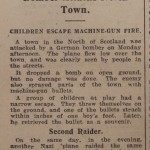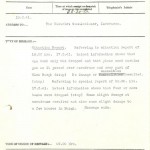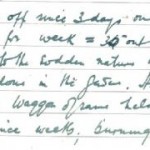The war this week was dominated by the German war against British convoys, with some 59,000 tons of shipping sunk, and the continued heavy bombing of British cities: London was attacked with incendiary bombs, and Plymouth and Liverpool were also attacked. On 20 March the short Italian spring offensive against Greek forces in Albania was called off after heavy losses and no gains.

Wick airfield was attacked by two German bombers on 17 March. As the John O’Groat Journal reported, “The plane flew low over the town and was clearly seen by people in the streets. It dropped a bomb on open ground, but no damage was done. The enemy also sprayed parts of the town with machine-gun bullets. A group of children at play had a narrow escape. They threw themselves to the ground and one of the bullets struck within inches of one boy’s foot. Later, he retrieved the bullet as a souvenir.”

A second bomber attacked later the same day. Wick Control Centre recorded, “Latest information shows that one bomb only was dropped and that plane used machine gun as it passed over aerodrome and over part of Wick Burgh.” Later reports showed that four bombs were dropped: “Some slight damage at aerodrome resulted and also some slight damage to a few houses in Burgh”.
 The coastline of Caithness continued to suffer from mines and other explosive devices being washed up on the shore. This week it was the turn of Brough Bay in Dunnet: “There was an explosion in Brough Bay this morning at 7am. It appeared as if it was a mine or cylinder.”
The coastline of Caithness continued to suffer from mines and other explosive devices being washed up on the shore. This week it was the turn of Brough Bay in Dunnet: “There was an explosion in Brough Bay this morning at 7am. It appeared as if it was a mine or cylinder.”
Meanwhile conditions were proving difficult in Stemster School. The head teacher recorded in  the log book: “Owing to the sodden nature of the soil no digging [could] be done in the garden. Handicapped for lack of coal. Waggon of same held up on the railway lines since weeks; burning slick since Thursday.” It seems that the wagons of coal were being sidelined in favour of shipments of military supplies.
the log book: “Owing to the sodden nature of the soil no digging [could] be done in the garden. Handicapped for lack of coal. Waggon of same held up on the railway lines since weeks; burning slick since Thursday.” It seems that the wagons of coal were being sidelined in favour of shipments of military supplies.
 Finally this week, it appears that the Government had issued advice recommending the taking of sugar in porridge. This produced the following riposte in the letters column of the John O’Groat Journal: “Sir, – Have H.M. Government lost their wits when they recommend “sugared” porridge? It takes a Celt to teach the Sassenachs the art of porridge-making. From 15 to 20 minutes’ boiling of the oatmeal and a pinch of salt, then dish and sprinkle oatmeal over the porridge. Then you have porridge ideal and proper. Sugar is seriously scarce; why, then, a ridiculous wastage, and unnatural, in good Scottish porridge – providing bone and muscle to the genus homo?”
Finally this week, it appears that the Government had issued advice recommending the taking of sugar in porridge. This produced the following riposte in the letters column of the John O’Groat Journal: “Sir, – Have H.M. Government lost their wits when they recommend “sugared” porridge? It takes a Celt to teach the Sassenachs the art of porridge-making. From 15 to 20 minutes’ boiling of the oatmeal and a pinch of salt, then dish and sprinkle oatmeal over the porridge. Then you have porridge ideal and proper. Sugar is seriously scarce; why, then, a ridiculous wastage, and unnatural, in good Scottish porridge – providing bone and muscle to the genus homo?”
